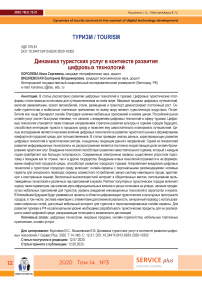Dynamics of tourist services in the context of digital technology development
Автор: Koroleva Inna S., Vishnevskaya Ekaterina V.
Журнал: Сервис plus @servis-plus
Рубрика: Туризм
Статья в выпуске: 3 т.14, 2020 года.
Бесплатный доступ
The article considers the development of digital technologies in tourism. Digital travel platforms have be- come an important source for travelers around the world. Global sales of digital travel, including airlines, car rentals, hotels, accommodation, and transportation, are showing steady growth. Online travel agencies and mobile payment apps around the world are changing the travel industry. Consumers are increasingly booking online due to the availability of mobile apps and low prices. The Russian market of online services is growing rapidly, due to the introduction of digital technologies in the tourism sector. Digital technologies are also becoming the key strategy for the development of culture and tourism in the cities of the future, contributing to the integration of tourists into the urban environment and allowing them to plan their own trip. The purpose of the research is to study the impact of digital technologies on the development of the tourist market and the formation of a comfortable urban environment for travelers. The article analyzes the data that characterize the development of digital technologies in the tourism sector, and highlights the trends in this direction. One of the indica- tors of the development of information technologies and their dissemination is the constantly increasing share of online booking of tourist services. The introduction of technologies contributes to the development of independent tourism, which is becoming more and more popular every year. Modern electronic services have significantly simplified the preparation for trips both within the country and to other countries. The implementation of new technologies also affects the formation of a comfortable urban environment, contributing to the development of urban tourism. The directions for implementing digital technologies in the tourist urban environment include online services with personal recommendations; wearable gadgets for simultaneous translation; shared consumption services; a smart navigation system in the city that is adaptive to foreign languages; free high-speed Internet in public places; the use of multimedia technologies and various guide ap- plications in museums. The rating of popular tourist cities includes an assessment of such parameters as the availability of multifunctional kiosks and smart stops on the streets, the availability of advanced mobile apps for tourists, the level of implementation of innovative technologies in airports and museums. In the near future, they will develop projects in the field of digitalization of tourist and cultural spaces of cities, including a navigation system with elements of augmented real- ity, simultaneous translation with the use of neural networks, accessible mobile Internet for tourists and personalized online services. For the development of tourism in the Russian Federation at the regional level, it is necessary to develop tourism products for their implementation in the new digital environment, revealing the potential and opportunities of destinations.
Digital technologies, global sales, online travel agencies, mobile payment apps, online services
Короткий адрес: https://sciup.org/140249913
IDR: 140249913 | УДК: 379.81 | DOI: 10.24411/2413-693X-2020-10302
Текст научной статьи Dynamics of tourist services in the context of digital technology development
Introduction. The world tourism industry is experiencing fundamental changes related to technology. Over the past decade, the development of technology has thoroughly transformed the process of studying and booking of tourism services. Digital technologies are also becoming the main way of the development strategy of the culture and tourism in the cities of the future. Digital technologies in the city space contribute to the tourist’s instant integration into the city environment and allow him to plan his trip on his own, communicate with local residents through an earphone with synchronous translation, receive personalized recommendations of visiting museums and places of recreation and entertainment, taking into account his pre reverence. In 2019, the e-commerce industry generates $ 3.45 trillion. Modern users spend about 5 hours a week for online-shopping. All that determines the relevance of studying the impact of digital technology on the development of the tourism market.
Russian and foreign scientific articles are devoted to the use of information and communication technologies in tourism. This topic was investigated by Gulyaev V. G.. He pointed out that information technologies are part of the organizational activity of tourism (Gulyaev, 2013). A. M. Vetitnev (Vetitnev, 2016), A. D Chudnovsky (Chud-novsky, 2006), and S. V. Sinatorov (Sinatorov, 2015) dedicated their research to information technologies in the tourism sector. The Tourism industrial have been huge changes with the advent of the Internet. Application of Internet technologies in the tourism industry have been studied in the works of S. p. Esaulova And N. N. Shakhovalov. L. A. Rodi-gina (Krulikovsky, 2019).
Morozov M. M. engaged in research on the consequences of tourism digitalization at the macro level. He highlighting the distinctive feature of the tourist business in the conditions of digitalization:
-
1) the information component,
-
2) variety of information flows.
This which is accompanied by the need for constant actualization information, high speed of exchange of information operations between all business entities (Morozov, 2016).
The quality of a tourist product is determining not only by the quality of the basic services provided, but also by the availability and level of information and communication support in modern conditions. M. S. Oborin, M. A. Zhukova, and N. S. Morozova are studying the impact of digital technologies on the development of the tourist information space (Oborin, 2019, and Morozova, 2014).
The research purpose is to learn the impact of digital technology on the development of the tourist market and the formation of a comfortable city environment for travelers.
Materials and research methods. As the source material, we used statistical data which characterize the development of digital technologies in the tourism sector, analytical reports of research of the market for online sales of tourism services in the Russian Federation and in the world. As a research methodology was used a theoretical and comparative analysis.
Research results and discussion. Currently, among of the main trends in the travel area can be identified the following trends.
-
1. The rising role of an individual approach to consumers in all areas of the tourism industry. The ability to extract maximum information about customers from analytical data allows to achieve significant success, because more and more travelers want to get individual service. Tourism enterprises must anticipate the needs of travelers, understand problems and anticipate their occurrence using data and business intelligence. Today, we can observe an improvement in the quality of customer service by means of significant investments in artificial intelligence and analytics, but the application of these technologies at each step of travel organization is onwards.
-
2. Continuous development of multimedia content and technology. As the industry develops new approaches to the promotion of tourism services and technological standards, there is a continuous development of multimedia content. Thanks to a huge selection of multimedia content, travel service providers will have all resources of personalizing the service for each traveler. Most tourists need technological innovations in the travel area (for example, mobile travel guides) that will make the trip experience truly unique (Vishnevskaya, 2017). The introduction of technology will simplify the standard operations of tourists. This, for example, real-time baggage tracking through a phone, combining trip planning and booking any services in one application.
-
3. The emergence of «smart cities». One of the trends that most clearly reflects the complexity and exactingness of the consumer world of the future is the emergence of «smart cities». The future of tourism will be determined by multimodal transport and analytical data, which will provide a more personalized and high-quality service. The emergence of «smart cities» will contribute to the development of tourism and travelers will receive the highest level of service.
-
4. Traveling to good use. When choosing a vacation destination, tourists pay more attention to the possibilities of self-realization — whether they can learn something new during the trip. Representatives of Generation Z (people born after 1995) value the practical skills acquired during the trip more than a diploma of higher education. The research conducted by Booking. com showed that the most popular trips are cultural exchange trips (according to 68% of respondents), volunteer trips (54%) and work abroad (52%). It should be noted that Russians, travel with the goal of self-realization is unlikely to be a priority so far.
-
5. Travel with attention to other people and the planet. Millennials and Generation Z will look for eco-friendly travel options, and homeowners, in their turn, will recycle plastic waste and improve their reputation as a socially responsible business (Slinkova, 2017). The vast majority of travelers around the world claim that they will devote time to reducing the negative impact on the environment during their trip (Booking. com ..., 2017).
2020 Том 14 №3
Let’s consider in more detail the interrelated areas — the development of multimedia content and technologies and the emergence of «smart cities». It should be noted that the Government of the Russian Federation approved the strategy for the development of tourism in Russia until 2035 and the development of digital technologies was named an important direction in the document. Digital tourism technologies include:
-
— transformation of all government services connected to the realization of tourism activities in electronic form;
-
— providing the opportunity for the participants of the tourism market to submit all established documents in electronic form;
-
— Integration of state information systems connected to the provision of tourism activities to eliminate the double provision of information, the use of digital solutions to improve interaction with the entrepreneurial and expert community in the development and implementation of tourism projects.
One of the important tasks for the development of inland and inbound tourism is the creation of conditions for the formation of a tourism ecosystem that unites all market members on an online platform for creating the best customer experience, integrated with external data sources and social platforms (Koroleva, 2017). Various blocks, services and mobile applications can be developed on the basis of the platform and the functions of the platform will be aimed at developing a system for promoting the tourist product of the Russian Federation.
Among «the most important digital solutions» the government singled out:
-
— Creation of a tourist market place and centralization of efforts to promote the tourist product of the Russian Federation;
-
— Introduction and development of multilingual tourist assistance services, including information services, navigation and self-service services, in order to increasing the availability, quality and attractiveness of tourism services, and increasing the efficiency of using tourist resources;
-
— development and realization of an electronic tourist guest card and a similar mobile application in cities and regions of the Russian Federation (an analogue of international maps and applications for mobile devices that allow tourists to travel by public transport, learn about any cultural events, enjoy discounts when visiting tourist attractions, as well as providing other benefits);
-
— providing a transparent electronic system for assessing the quality of suggested tourist services, creating a rating of tourist services and objects of the tourist territories of the Russian Federation;
-
— providing the opportunity to get acquainted with cultural and natural attractions, museum exhibits, tourist routes in online mode using visualization technologies, virtual tours, augmented reality technologies, etc .;
-
— Creation and development of augmented reality services for navigation in cities and sights (museums, exhibition centers, art galleries, etc.) to increase the attractiveness of tourist objects and the efficient using of tourist resources;
-
— Development of an open data system in the tourism aria to increase the transparency of organizations and the industry management system, creating conditions for the development of new types of tourism services;
-
— the introduction and development of huge data and artificial intelligence technologies for the collection and analysis of this data, as well as the development of a system for promoting tourist services, formation of the most relevant offers for tourists considering their wishes, weather, driving conditions, etc .;
-
— Development of services for online construction of a tourist route with the possibility of buying tickets and booking hotels;
-
— Creation of an electronic platform for involving self-employed people in tourism activities (guides, instructors);
-
— Development of multimedia applications for attractions, services of audio and video guides with the ability to integrate with GPS navigation, using QR codes.
2020 Том 14 №3
One of the indicators of the development of information technologies and their distribution is the proportion of online booking of tourist services. According to researchers, the volume of the online travel booking market is gradually increasing (Analytics ..., 2016). The eTravel market in Russia is almost 800 billion rubles (2017) with stable growth of just over 20% per year (eTravel ..., 2018) (Fig. 1).
Online sales of tourist services is popular with a narrow segment of consumers: air and train tickets are purchased online by 20% of Russians, and hotels and tours by 12%. About half of the eTravel market in 2017 is airline tickets (Fig. 2).
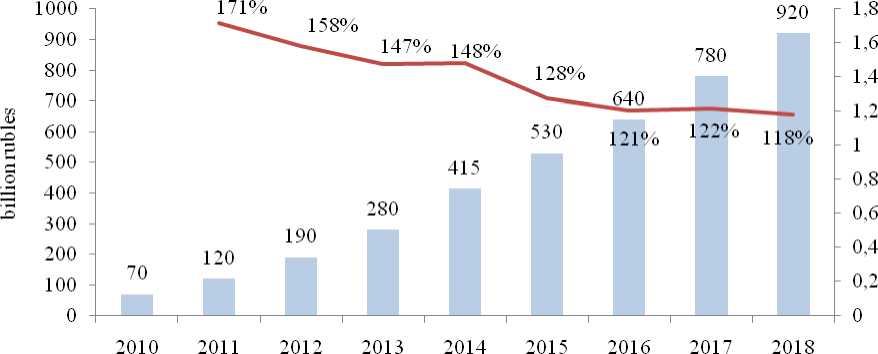
online sales, billion rubles growths rate. %
Fig. 1. Online sales of tourist services by Russian consumers
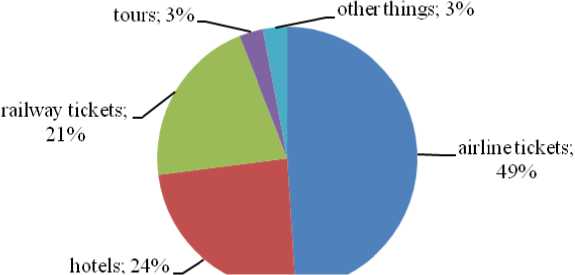
Fig. 2. Structure of the eTravel market in the Russian Federation in 2017
For the analyzed period 2015-2017 market segments changed insignificantly — airline tickets share decreased by 6%, the share of hotel and railway ticket bookings increased by 5% (from 19 to 24% and from 16 to 21%, appropriately). Tours are bought online by a small number of travelers (Fig. 3).
Since 2014, Russians have become less likely to fly abroad, but have increasingly begun to use airplanes to move around the country. Since 2017, the dynamics has changed — international flights have grown, inland flights, on the contrary, have decreased, but at the same time they have remained at high rates. In 2014, the vast majority (70%) planned trips through the web interface. In 2018, the trend changed — now it is more convenient for the majority to search and buy tickets through a smartphone (Fig. 4).
2020 Том 14 №3

■ airline tickets hotels railway tickets tours other things
Fig. 3. Dynamics of eTravel market segments in Russia in 2015-2017
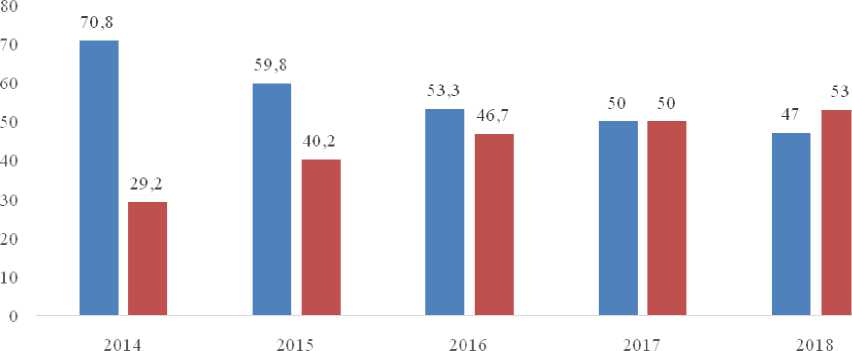
■ web ■mobiledevice
Fig. 4. Ratio of methods of booking flights to Russia,%
In 2018, witnessed an increase in air-transportation: flights around Russia + 11%, international + 34%, while the share of distant foreign countries in passenger traffic reached 34%. The fastest growing segment in air travel in 2018 was international charters (+61%). Since January to August 2019 63% of bookings were made on airline tickets in Russia and 37% for foreign flights (Experts said ..., 2019). According to analysts, the most popular domestic destinations are Simferopol (20.8% of all domestic sales), Sochi (14.8%), Krasnodar (7.9%), Mineralnye Vodi (6.4%) and Kaliningrad (5.7%). Among the foreign routes, the most popular flights to Burgas (8.7% of all sales to international destinations), Yerevan (7.9%), Tivat (3.5%), Barcelona (3.4%) and Prague (3.2%).
The average duration of trips in Russia compared to the summer of 2018 increased by one day- from
9 to 10 days, as for trips aboard- stayed pretty even- two weeks. Russians began to book airline tickets in advance: «depth» of purchase (period before departure) of airline tickets in Russia increased from 17 to 19 days, abroad — from 28 to 30 days.
Despite the development of online sales market of tourist services, major tour operators in Russia can’t be afraid tourists the transition to self-booking online, because the main determining factor of buying a tour is the price. Value for money — in the second place. This means that tourists, who have been traveling for several years, look at the quality of services provided. Mass tour operator that has its own Charter chains, own hotels or guaranteed reservation in major hotels, offers tourists low prices and this ensures the competitiveness.


Also important for tourists is the ability to be in touch with the tour operator and be able to get help and support in case of any problems. Mass tour operators focused on B2B market and there are no plans to expand sales of tours via the Internet for direct customers, offering them some discounts and bonuses.
Online travel services sales through a browser and apps have own features which are shown in the table № 1.
Table 1
Features of online travel services sales through a browser and application
|
Sales through a browser (including mobile web) |
Sales through a apps |
|
Rarely flying passengers |
Frequent flyers |
|
Standard average check |
Increased average check, large spread of orders by cost |
|
Major factor: price |
Major factor: satisfaction with the seller’s service. |
|
High cost of attracting traffic |
Shareware audience |
|
The predominance of direct sales of AK over OTA sales |
Leadership of OTA |
|
Large amount of traffic (large audience) — but low conversion rate |
Small audience — but great conversion rate |
Sales through a browser are popular with consumers who need save money, because the price on website for the service, as a rule, minimal, but the same time on websites are popular exactly search query, while most users make purchases through an apps.
The eTravel market in Russian Federation have a good growth potential: increase in the audience is possible due to those who plan to start booking tickets online by 1,8 times, hotels/ tours — by 2,4 times. Most growth potential in young audience segment 18-24 years old — by 3,5 times (by Analytics..., 2016). The growth online-market travel services is constrain unstable economic situation in the country and as a result — lack of vacation trips for many Russians.
The digital travel platforms become important resource for travelers in the world (Hojeghan, 2016). Worldwide sales of digital travel, including airlines, car rental, hotels, housing and transportation, will increase to $855,07 billion (Urquhart, 2019). Online travel agencies (OTA) and mobile apps for payment all over the world are change travel industry (Liberato, 2018; Matteo, 2019). Consumers are often use online-booking thanks to mobile apps and low prices. In 2018, sales of travel services worldwide increased by 10, 4% to $694, 41 billion.
China stands out for its high growth rates of on- line-booking (Cai, 2019; Pizam, 2017). The online-sales travel services in China were $133,90 billion in 2018 and this 20,5% more than in 2017.Expected that in China’s growth will be so fast that the country almost will get USA in terms of sales by the end of 2022 (Global Digital..., 2018).
The growth Russia’s market of online-booking of trips also characterized by high rates: transition of sales channels from offline into online and increase costs contribute to the sustainable expansion. Growing sector of car rental, fast increase in the number websites that deliver services and many OTA demonstrate that this dynamic market (Hasenzahl, 2019).
At the beginning 2019, there were 4,101 billion Internet users in the world, which is 53% of the world’s population (statistic of Internet..., 2019). This indicator increased in the number users of Internet who registered in the end 2016 (Fig. 5) by 3,42 billion. Densely populated Asia is still the region with the largest number of users, but in spite of this the share of subscribers from Asia slightly reduced-from 49, 7 to 49%. The second place belongs to the Europeans (16,8%), people of Africa (11%) and Latin America with the Caribbean republics (10,4%). Highly developed and computerized North America (USA and Canada) accounts for just 8,2% of the world’s total Internet users in 2019.
2020 Том 14 №3
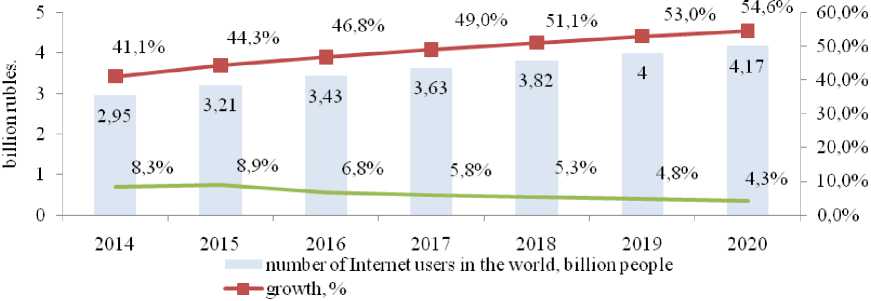
proportion of population. ? о
Fig. 5. Trends in the number of Internet users in the world
The share Internet users in Russia — 81% of citizens, including 65% use the web every day. Among Russians from 18 to 24 years old this indicator is 97% (The number of users..., 2019).
Introduction of modern technologies contribute development self-tourism whose year by year becoming increasingly popular (Vishnevskaya, 2017). The modern electron services significantly simplified the preparation for trips in the country and other states. Accessible online-travel is choice of skilled tourists and beginners, those who don’t want to confine yourself limits proposed tours of tour operators. Self-traveling is easy and comfortable. Especially if you know where go for information about directions, flying, booking hotels.
In our days world, every second person live in a city. Under forecasts UN by 2050 more than 67% of the world’s population will be concentrated in cities. Cities take the lead in global economy and this tendency will be increase over time.
So, let’s analyze the influence of development technology on becoming comfortable urban environment and tourists flow. In limits research PwC (Pricewaterhouse Coopers) «The future is close: urban readiness index» was analyzed how ready are world’s major cities to innovate and estimated modern features of big cities for introduction technological solution and products into different social areas, including tourism (The future is near..., 2017).
Directions of introduction of digital technologies into tourist’s urban environment have:
-
• Online services with personal recommendations based on big data;
-
• Wearable gadgets for simultaneous translation;
-
• Services for shared consumption;
-
• Smart navigation system in a city, adaptive to foreign languages;
-
• Free high-speed Internet in public areas;
-
• Use multimedia technologies and differ guide-apps in museums; (Fig. 6)
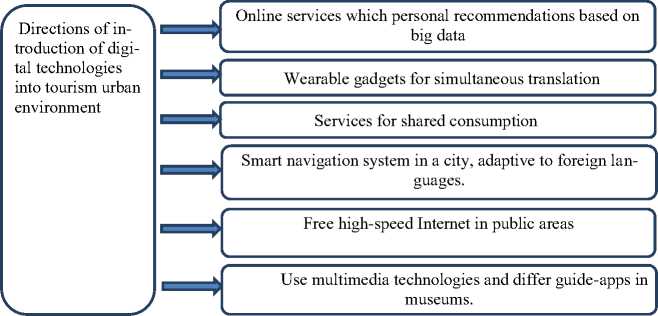
Fig. 6. Directions of digital technologies introduction into the tourist urban environment
2020 Том 14 №3
Barcelona, Singapore and Shanghai are leaders, because at the moment they showed most of all examples of projects on digitalization of culture and tourism objects. This follows from the evaluation of parameters such as availability of multifunctional kiosks and smart-stops on open air, modern mobile apps for tourists, introduction technologies in airports and museums. Moscow takes the fourth place in rating. The authorities set a strategic goal is complex informatization of culture and touristic space and becoming united information space for culture and touristic industry. Moscow, at the moment, has high indicators of development city infrastructure, for example covering streets and parks with free Wi-Fi signal. Organized 100% coverage oа Wi-Fi in the metro, yet there’s Moscow pass card which give the discounts for visit to museums, city tours and for travel on public transport (Аверин, 2019).
In 2020 in Moscow is planned to launch a digital platform, including website and mobile app for use different services for tourists (Онлайн-гид, 2019). The services will be including visit places, construction of transport schemes, booking and many others. Most of all, in future with the help of the platform it will be possible issue an electronic visa to visit Russia. Also it will allow to create their own unique journey around the capital and make it convenient, bringing together the city’s services and attractions. The service will be available on six languages, with round-the-clock support. Intellectual digital travel platform will be named «Russpass».
In near future will develop a projects in city’s digital touristic and culture spaces including: navigation system with augmented reality elements, simultaneous translation with neural networks, available mobile Internet for tourists and personalized online-services.
Conclusion. Conducted research showed that travel industry in Russia and in the world was becoming under the influence of development of digital technology. This requires participants in the tourism market to understand new trends that are transforming business by changing the way they communicate, collaborate, and exchange information. Digital technologies radically change lifestyle, leisure, mobility and tourism in all its forms. Develop tourism in Russia in our region need make the tourists products for their implementation in new digital sphere which reveals the potential and abilities of destinations.
Список литературы Dynamics of tourist services in the context of digital technology development
- Averin, D. (2017). Readiness of major cities for a digital future. URL: https://tjournal.ru/flood/60636-gotovnost-krupneyshih-gorodov-k-cifrovomu-budushchemu (Accessed on 29 September, 2019). (In Russ.)
- Cai, Wenjie (2019). Progress on Technology Use in Tourism. Journal of Hospitality and Tourism Technology. Available at: https://www.researchgate.net/publication/332672740_Progress_on_Technology_Use_in_Tourism (Accessed on 28 September,2019).
- Chudnovsky, A.D., Zhukova, M.A. (2006). Information technology management in tourism. Moscow: KNORUS. (In Russ.)
- Data Insight analytics. eTravel: numbers and trends (2016). URL: https://hotelier.pro/tourizm/item/2168-etravel/ (Accessed on 29 September, 2019).
- eTravel in Russia - 2018. Statistics and trends (2018). URL: http://datainsight.ru/sites/default/files/DI-TravelHub-2018.pdf (Accessed on 29 September, 2019). (In Russ.)
- Experts told how the spending of tourists on flights has changed. URL: https://ria.ru/20190822/1557776933.html (Accessed on 29 September, 2019). (In Russ.)
- Global Digital Travel Sales 2018. Fvailable at: https://www.emarketer.com/content/global-digital-travel-sales-2018 (Accessed 29 september 2019).
- Gulyaev, V. G. (2013). New information technologies in tourism. Moscow: PRIOR University. (In Russ.)
- Hasenzahl, Lea (2019). Digital transformation in the national tourism policies. Conference: 20th Annual International Conference on Digital Government Research. URL: https://www.researchgate.net/publication/333792896_Digital_transformation_in_the_national_tourism_policies (Accessed on 19 September, 2019).
- Hojeghan, Samira (2016). Digital economy and tourism impacts, influences and challenges. Procedia Social and Behavioral Sciences, 19: 308-316. URL:https://www.researchgate.net/publication/251714067_Digital_economy_and_tourism_impacts_influences_and_challenges (Accessed on 08 September, 2019).
- How tourism will change in 2019 (2018). URL: https://www.tourdom.ru/hotline/it-razrabotki-dlya-turbiznesa/kak-izmenitsya-turizm-v-2019-godu/ (Accessed on 29 September, 2019). (In Russ.)
- Koroleva, I.S., & Komarov, M.E. (2007). Problems of development of recreation and tourism in old developed territories (on the example of the Belgorod region). Prblemi regionalnoy eklogii [Problems of regional ecology], 6, 109-113. (In Russ.)
- Krulikovsky, A.P., & Kosyuk, N.S. (2019). The role of the digital economy in the development of tourism business. Tendentsii razvitiya internet i tsifrovoi ekonomiki [Trends in the development of the Internet and digital economy]: proceedings of the II Russian Scientific and Practical Conference, 123-126. (In Russ.)
- Liberato, Pedro (2018). The Information Technologies in the Competitiveness of the Tourism Sector. Conference: International Conference on Information Technology & Systems. URL: https://www.researchgate.net/publication/322247972_The_Information_Technologies_in_the_Competitiveness_of_the_Tourism_Sector (Accessed on 18 September 2019).
- Matteo, Dante (2018). Tourism and digital endowment in Italy: a spatial analysis. Annali del Turismo, VII. URL: https://www.researchgate.net/publication/333812432_Tourism_and_digital_endowment_in_Italy_a_spatial_analysis/stats (Accessed on 18 September 2019).
- Morozov, M.M. (2018). Peculiarities of management of tourist systems in conditions of digital economy. Turizm. Pravo i econmika [Tourism. Right and Economics], 3 (66), 7-11. (In Russ.).
- Morozova, N.S., Morozov, M.A., Chudnovsky, A.D., Zhukova, M.A., & Rodigin, L.A. (2014). Information support of tourism. Moscow: International Tourism Agency. (In Russ.).
- Number of Internet users in Russia (2018). URL: http://www.bizhit.ru/index/users_count/0-151 (Accessed on 29 September, 2019) (In Russ.).
- Oborin, M. S., & Saryan, A. A. (2019). The role of digital technologies in the developing the information space of regional tourism management. Servis v Rossii i za rubezhom [Services in Russia and Abroad], 13(3), 24-33. 10.24411/1995-042X-2019-10302. (In Russ).
- DOI: 10.24411/1995-042X-2019-10302.(InRuss)
- Online guide for tourists to appear in Moscow in 2020 (2019). URL: https://iz.ru/926381/2019-09-28/onlain-gid-dlia-turistov-poiavitsia-v-moskve-v-2020-godu (Accessed on 23 September, 2019).
- Pizam, A. (2017). The internet of things (IoT): The next challenge to the hospitality industry. International Journal of Hospitality Management, 62 (April), 132-133. URL: 10.1016/j.ijhm.2017.02.002 (Accessed on 22 September 2019).
- DOI: 10.1016/j.ijhm.2017.02.002(Accessedon22September2019)
- Sinatorov, S.V., Pikulik, O.V., Bochenina, N.V. (2015). Information Technology in Tourism. Moscow: Infra-m. (In Russ.).
- Slinkova, O.K. (2017). Agroturism in the system of the world tourist market. Scientific result. Business and Service Technologies, 3 (3), 74-82. (In Russ.).
- DOI: DOI: 10.18413/2408-9346-2017-3-3-73-81
- Statistics of the Internet of 2019: traffic, the websites and blogs, domains, social media, online advertizing and electronic commerce - fresh digits and the facts. URL: https://sdvv.ru/articles/elektronnaya-kommertsiya/statistika-interneta-2019-trafik-sayty-i-blogi-domeny-sotsialnye-media-onlayn-reklama-i-elektronnaya (Accessed on 29 September, 2019). (In Russ.).
- The company Booking.com named trends of sustainable tourism (2017). URL: https://news.booking.com/sustainabilityreport2017/ (Accessed on 29 September, 2019).
- The future is close: the cities readiness index (2017). URL: https://www.pwc.ru/ru/assets/the-future-is-coming-rus.pdf (Accessed on 29 September, 2019). (In Russ.).
- Urquhart, Ellis (2019). Technological mediation in the future of experiential tourism. Special Issue "The future of experiential travel" in Elsevier's Journal of Tourism Futures. URL: https://www.emarketer.com/Report/Global-Digital-Travel-Platforms-2017-Country-by-Country-Review-of-Top-Travel-Sites/2002133 (Accessed on 22 September, 2019).
- Vetitnev, A.M., & Kovalenko, V. V. (2016). Information technologies in the tourism industry. Mosccow: Yurayt Publishing House, 2016. (In Russ.).
- Vishnevskaya E.V., Bogomazova I.V., Litvinova M.I. (2012). Topical problems of GIS use in the development of regional tourism of the Belgorod region. Fundamentalnie issledovaniya [Fundamental study], 3-1, 177-180. (In Russ.).
- Vishnevskaya, E.V., Klimova, T.B., Slinkova, O.K. & Glumova, Y.G. (2017). The influence of virtual information space on tourism development. Revista Espacios, 38 (49), 22. URL: http://www.revistaespacios.com/a17v38n49/17384922.html (Accessed on 23 September, 2019).

